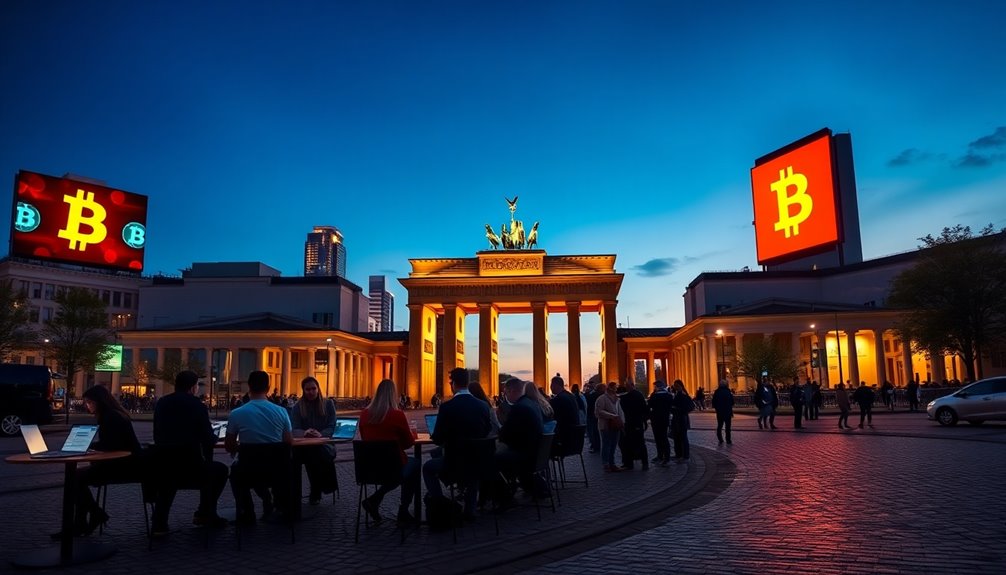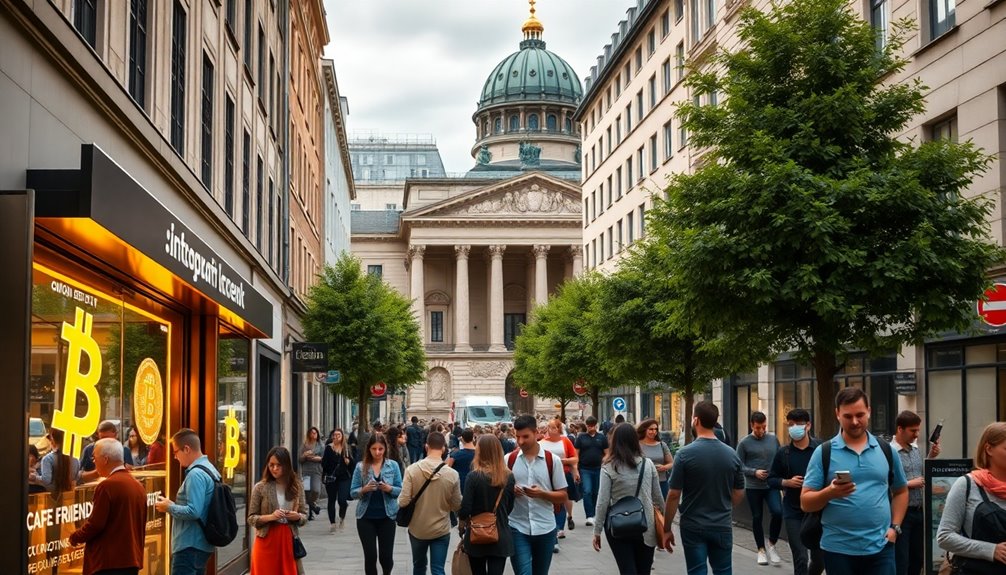Germany's push to adopt Bitcoin is set to revolutionize the digital currency landscape. With clear regulations and efforts like the upcoming MiCA framework, the government fosters a secure environment for investors. As transaction volumes rise, Germany ranks close to the top in crypto usage, reflecting growing public interest. This adaptation increases potential for Bitcoin ETFs and broader market participation, enhancing investor confidence. Additionally, educational initiatives are addressing public misconceptions, paving the way for wider acceptance. If you explore further, you'll uncover how these trends might reshape everyday transactions and the long-term vision for a sustainable Bitcoin ecosystem.
Key Takeaways
- Germany's regulatory framework, including BaFin licensing, fosters trust and attracts investors to the cryptocurrency market.
- The upcoming MiCA framework aims to protect investors and ensure stability, enhancing Bitcoin's legitimacy.
- A growing user base and increasing transaction volume position Germany as a key player in the global cryptocurrency landscape.
- Educational initiatives and public perception campaigns are reshaping attitudes towards Bitcoin, promoting greater acceptance and adoption.
- Potential Bitcoin ETFs could democratize investment opportunities and further integrate Bitcoin into traditional financial systems.
Key Concepts of Bitcoin

When you dive into Bitcoin, it's crucial to grasp its key concepts, especially the ideas of disintermediation, distribution, decentralization, and trustlessness.
Disintermediation means you can transact directly with others online, cutting out the middleman, which boosts efficiency. The Bitcoin network verifies and confirms these peer-to-peer transactions, making the blockchain invaluable.
Bitcoin operates on a distributed network of thousands of computers, sharing the workload and enhancing reliability. This distributed nature ensures that there is no single point of failure in the network, further increasing resilience.
With no central control or management, it prevents single points of failure. This decentralized nature fosters security and trust through a consensus mechanism, allowing transactions to occur without intermediaries.
Ultimately, Bitcoin's trustless environment ensures your transactions remain private and secure, redefining how we think about digital currency.
Germany's Role in Bitcoin

Germany's involvement in Bitcoin reflects a growing recognition of its potential impact on the financial landscape.
As a leader in crypto regulation, you'll find that all exchanges must be licensed by BaFin, ensuring compliance with AML and KYC standards.
The upcoming MiCA framework aims to protect investors while fostering stability, set to take effect in summer 2024.
Moreover, Germany is nearly among the top 20 countries for crypto adoption based on transaction volume.
The discussion of integrating Bitcoin into government bonds and considering it as a reserve currency showcases Germany's commitment to innovation. In addition, the steady increase in user base and transactions indicates a growing interest in cryptocurrencies among the German population.
With potential Bitcoin ETFs on the horizon, the nation is paving the way for a more robust and regulated cryptocurrency market.
Blockchain Transaction Verification Process

Understanding the blockchain transaction verification process is crucial for anyone looking to grasp how cryptocurrencies like Bitcoin operate.
First, miners execute the Signature Script alongside the PubKey Script to validate transactions. The PubKey Script follows a six-step process that ensures thorough verification. This process is essential for preventing double-spending, which can undermine the integrity of the Bitcoin network.
Once validated, transactions are added to a block, which undergoes its own validation to confirm all included transactions are accurate. The block is then incorporated into the blockchain after achieving network consensus.
Techniques like cryptographic puzzles and proof-of-work enhance security, while digital signatures verify identities.
You can track transactions using unique IDs and see real-time updates on blockchain platforms, ensuring transparency and integrity throughout the process.
Pros and Cons of Adoption

The blockchain transaction verification process sets the stage for evaluating the pros and cons of Bitcoin adoption in Germany.
On the positive side, regulatory clarity can attract investors, enhancing trust and efficiency in transactions. With Bitcoin ETFs, you gain easy access to the cryptocurrency market, democratizing investment opportunities. Plus, holding Bitcoin as a strategic reserve asset could hedge against inflation while potentially offering higher returns. Furthermore, Germany's interest in issuing government bonds on blockchain technology reflects a commitment to integrating digital assets into its financial landscape.
However, risks exist, including market volatility and regulatory challenges that could hinder widespread adoption. Additionally, the technology requires significant infrastructure investment, which might divert resources from other sectors.
Balancing these pros and cons is crucial as Germany navigates its Bitcoin adoption journey.
Germany Versus Other Countries

As cryptocurrency adoption continues to gain traction worldwide, Germany finds itself in a competitive landscape where it nearly ranks among the top 20 countries by transaction volume.
The U.S. leads the pack, but Germany closely follows, boasting a strong technical base and user interest. Within Europe, it stands out as a key player, especially with Bitcoin and Ethereum gaining significant traction. The potential introduction of Bitcoin ETFs could further boost its standing. With increasing investor confidence, a notable percentage of Germans already own cryptocurrencies, positioning Germany as a future leader in blockchain development. As the government actively explores integrating Bitcoin into its financial framework, Germany's initiatives align it with global trends, especially those emerging from the U.S. Additionally, the expected launch of Bitcoin ETFs in the EU could significantly enhance market depth and adoption rates. Furthermore, the rise of Decentralized Autonomous Organizations (DAOs) may provide innovative governance structures that could benefit German investors and entrepreneurs alike.
Regulatory Compliance Hurdles

Germany's position as a leader in cryptocurrency adoption faces significant challenges due to regulatory compliance hurdles.
You'll find that mandatory licensing under MiCA requires all crypto service providers to secure a license from BaFin, which can burden smaller firms with higher costs and complex documentation. Larger companies may navigate these changes more easily, but the regulatory landscape remains daunting. Furthermore, compliance with AML and KYC regulations is essential for maintaining market integrity.
Additionally, strict anti-money laundering regulations demand thorough KYC procedures, increasing operational scrutiny.
The political instability in Germany complicates matters further, stalling the passage of essential laws and leaving companies in a regulatory void.
Without clear guidelines, you might see domestic firms struggle to compete against foreign entities that operate under more stable regulatory frameworks.
Emerging Bitcoin Payment Solutions

Innovations in Bitcoin payment solutions are reshaping the financial landscape in Germany. Deutsche Bank's partnership with Bitpanda allows you to make real-time payments, integrating your transactional accounts for seamless fiat transactions.
With access to German IBANs, you no longer have to deal with intermediaries or long processing times, enhancing your payment experience. Additionally, cryptocurrencies are recognized as legal means of payment in Germany, which further supports the growth of Bitcoin adoption.
NOWPayments stands out as a leading payment gateway, supporting over 300 cryptocurrencies. You can enjoy low transaction fees and easy integration with platforms like WooCommerce and Magento.
This means you can efficiently accept digital payments while benefiting from robust security through its non-custodial model. Together, these solutions are making Bitcoin payments more accessible and user-friendly for everyone in Germany.
User Education and Awareness

User education and awareness play a crucial role in driving Bitcoin adoption in Germany. Initiatives like the massive sticker campaign from Ideas Are Like Flames aim to reshape public perception by spreading pro-Bitcoin messages across cities. The campaign has seen stickers spotted in various countries, helping to increase awareness.
You can easily join this effort by downloading and creating your own stickers, helping to increase awareness. Furthermore, Joana Cotar's educational initiatives in the Bundestag work to inform lawmakers about Bitcoin's benefits and potential legal recognition. This balanced approach addresses misconceptions and promotes a regulatory framework that supports innovation while managing risks.
Frequently Asked Questions
How Can Individuals Invest in Bitcoin Safely in Germany?
To invest in Bitcoin safely in Germany, start by choosing licensed exchanges approved by BaFin.
Make sure they implement strong KYC and AML procedures.
Always use secure wallets with two-factor authentication and avoid public Wi-Fi.
Regularly monitor market trends and watch out for scams, verifying any investment opportunities.
Lastly, stay updated on BaFin's warnings to ensure your investments are protected from fraud and comply with local regulations.
What Are the Tax Implications of Bitcoin Transactions in Germany?
When you're navigating the nuanced world of Bitcoin in Germany, you'll find fascinating tax factors.
If you hold your crypto for over a year, it's tax-free! Short-term gains up to €600 are also exempt.
However, be mindful of mining rewards—those count as income. You'll need to report your crypto earnings alongside regular income.
Staying savvy about these stipulations ensures you avoid penalties and enhance your financial future effectively.
Can Bitcoin Be Used for Everyday Purchases in Germany?
Yes, you can use Bitcoin for everyday purchases in Germany. Many retailers, including MediaMarkt and Zalando, accept Bitcoin via gift cards and vouchers.
Popular companies like Lufthansa and Burger King also allow Bitcoin payments directly.
You'll find online services like Netflix and Google Play that accept Bitcoin as well.
With growing acceptance and various payment methods, using Bitcoin for your shopping needs is becoming more convenient and accessible in Germany.
Are There Any Bitcoin ATMS in Germany?
Did you know there are 176 Bitcoin ATMs scattered across Germany?
If you're looking to use one, major cities like Düsseldorf, Berlin, and Stuttgart have plenty to choose from. In Düsseldorf alone, you'll find around 22 ATMs!
However, be prepared for stricter regulations, as you might need to provide identification due to Know-Your-Customer (KYC) procedures.
How Does Bitcoin Mining Work in Germany?
In Germany, Bitcoin mining works by tapping into surplus energy from renewable sources like wind and solar.
You'll find mining rigs set up in locations like Backnang, where they convert excess energy into digital currency.
Deutsche Telekom manages operations, ensuring efficiency and minimal downtime.
This approach not only stabilizes the energy grid but also promotes environmental consciousness.
Conclusion
Germany’s potential to lead in Bitcoin adoption is like a spark igniting a wildfire in the digital currency landscape. As it navigates regulatory hurdles and fosters user education, the country’s innovations in blockchain technology and payment solutions could reshape how we view and use cryptocurrency. Embracing these changes not only benefits Germany but also sets a precedent for other nations. You have the power to be part of this transformation—stay informed and engaged in the ever-evolving world of Bitcoin. Germany’s Bitcoin regulatory challenges may pose obstacles, but they also present opportunities for growth and collaboration within the industry. By addressing these issues head-on, Germany can create a robust framework that encourages investment and innovation while ensuring consumer protection. As the nation leads by example, it can inspire a global movement towards clearer, more effective cryptocurrency regulations, ultimately paving the way for a more inclusive financial future.









